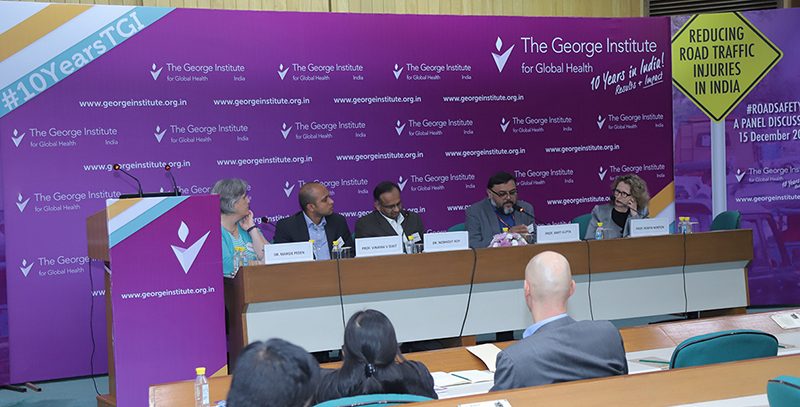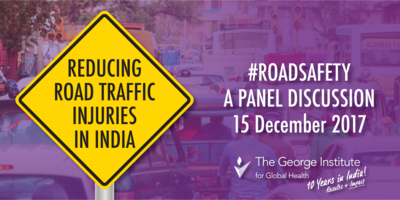
Experts discuss reducing road traffic injuries in India
The George Institute for Global Health organised a panel discussion on road traffic injuries as part of its 10th Anniversary celebrations on December 15, 2017. The panel discussed current priorities for achieving road safety targets in India and took stock of the prioritised actions for the UN Decade for Road Safety, following the Phuket commitment which was signed by the ministers in the SEAR region.
In his address, Dr Fikru Tullu of WHO India, traced the efforts being made in the SEAR region to implement road safety measures and said that the focus was on vulnerable road users. Shri U.S.Kurmi, Deputy Director, Department of Education, Delhi Government, who has been personally through five road accidents, spoke about the common causes and behaviours leading to road crashes.
Presenting on a recent project undertaken in PGIMER, Chandigarh where the economic and social cost of road safety was measured by following up 2950 individuals at 0, 6 and 12 months, Dr. Rajesh Kumar, Dean, School of Public Health, PGIMER, said that the average cost per individual was very high and so was the loss of productivity measures in terms of Indian rupees and that road traffic injuries, pose a huge economic and social burden. He also said that India’s cashless scheme on insurance has had some effect on reducing the burden of road traffic injuries.
Dr Rebecca Ivers, Head of Injury division at The George Institute for Global health spoke about the need for enforcement and gave examples from Vietnam and Indonesia that proved that good enforcement is more important and critical than driver education. We need to shift the pendulum from individual behaviour change to enforcing safety measures, she said. Dr Jagnoor, Head of India Injury division at The George Institute for Global Health spoke about the lack of data and how it creates an impediment to taking effective measures on road safety.
Dr Manjul Joshipura, Director of the Academy of Traumatology in India spoke about the importance of trauma care and how intervening in the golden hour is important to save lives.
In the panel discussion that followed, Dr Robyn Norton, Principal Director, George Institute for Global Health, spoke about the safe systems approach and the need to ensure that the five pillars of road safety are implemented in letter and spirit. It is sad, she said that among the SDG targets, the ones relating to road safety have not been met.
Nobhojit Roy, Advisor to the Ministry for Health and Family Welfare, spoke about the importance of policy and how it is important to ensure that it is evidence-based. Policies have thus far been knee-jerk reactions to court judgements and they need to be more pro-active and evidence-based, he argued. It is important to compress data and come up with a policy brief for policy-makers who may not necessarily know how to read data, he said.
Dr Amit Gupta of the All India Institute of Medical Sciences spoke about the Australia-India Trauma collaboration and how several levels of trauma care are being addressed as part of the project. He said hospitals are yet to realise the importance of in-hospital data as registry data
Dr Peden, head of UK Injury division, the George Institute for Global Health said that it was critical for us all to prioritise actions for road safety and build more evidence through research for successful intervention efforts.


